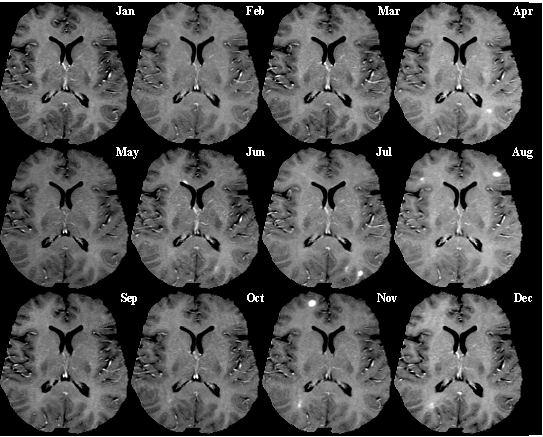Drugs repair damage from MS
Interview with
 Multiple Sclerosis is a major cause of disability in the population. It's caused by the immune system attacking a substance in the brain called myelin, which wraps around nerve fibres and works a bit like the insulation around an electrical cable. Loss of myelin is what causes the disability in MS sufferers. But there are stem cells in the brain that can make new myelin, and now Case Western University scientist Paul Tesar has found two drugs that are already on the shelves of the average chemist shop, and can kick-start these stem cells into action to repair the damage, as he explained to Chris Smith...
Multiple Sclerosis is a major cause of disability in the population. It's caused by the immune system attacking a substance in the brain called myelin, which wraps around nerve fibres and works a bit like the insulation around an electrical cable. Loss of myelin is what causes the disability in MS sufferers. But there are stem cells in the brain that can make new myelin, and now Case Western University scientist Paul Tesar has found two drugs that are already on the shelves of the average chemist shop, and can kick-start these stem cells into action to repair the damage, as he explained to Chris Smith...
Paul - MS has a large patient population and of course, pharmaceutical industries have developed a large number of drugs to target this disease. But all of these drugs are really focused on the immunological component of the disorder and actually, fail to regenerate the cells that are lost in the brain. And so, our goal was really to catalyse the body's own stem cells to replace those cells that are lost in multiple sclerosis. And so, what we really wanted to do was to talk to these stem cells already in the brain and instruct them to regenerate those specialised cells that are normally destroyed in multiple sclerosis patients.
Chris - So, how did you go about trying to persuade the brain to put itself right?
Paul - Of course, we know that there are stem cells throughout the brain that are capable of regenerating or replacing these cells that are lost. But in MS, they fail to do so efficiently. And so, we wanted to ask if we could really provide a system where we could test large numbers of drug for their ability to jump-start or to spark these stem cells forward to replace those damaged cells.
Chris - How many drugs did you screen?
Paul - So, in this initial study, we screened 727 drugs that have already been tested in humans or that are currently available for clinical use for other indications.
Chris - Did you get any hits? Were there any that were particularly good at stimulating these stem cells to regenerate myelin - the stuff that's lost in the brain?
Paul - What we were really surprised to see is that within the top set of the most potent drugs were two classes of compounds. A drug called Miconazole which is a topical antifungal drug. The second is Clobetasol which again, is also a topical drug used for skin conditions like eczema or psoriasis.
Chris - If you put these drugs into say, a mouse, with the mouse or rodent equivalent of MS, do they do in the brain - in situ - what they appear to do in the dish?
Paul - We were really excited to see that systemic administration of each of these two drugs independently were able to catalyse or spark these stem cells in the central nervous system of these mouse models of multiple sclerosis and to regenerate them, to allow them to create new cells that are able to reduce disease severity and also, reverse paralysis in these animal models.
Chris - So, there was a genuine clinical benefit in the animals. It wasn't just a subtle effect where you got a few more stem cells. You could actually show that animals that were treated with these agents performed much better afterwards.
Paul - Yes, absolutely. So, we saw a statistically significant reduction in disease severity which equates to the ability of these animals to regain use of their hind limbs which were initially paralysed by the disease.
Chris - And would this also work in a human do you think?
Paul - Well, that's really the billion-pound question here, how could we leverage the data that we've gotten from the study to move this forward into clinical testing. The idea that we could be testing drugs that have already been approved for other indications potentially allows us to move this into the clinic quicker. But the current hits from the screen are proved for topical use. And so, we're really working very intensely now in how we might modify the dosing of the delivery or even modifying the compound itself that would really allow us to safely and effectively deliver these drugs systemically. I think if that went well, we might be able to begin testing some of these in the next few years. I want to strongly caution that the use of these current drugs which are only approved for topical use are not amenable to systemic administration at this time.
Kat - It's an important point but it is still very exciting news although they don't actually know how the drugs are working yet and that's what they're looking at now. That's Paul Tesar talking to Chris.
- Previous Why mosquitoes prefer some people
- Next Happy Birthday Hubble










Comments
Add a comment